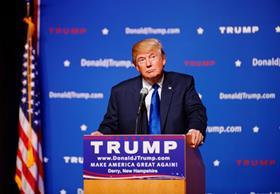
Between the stunning victory of Donald Trump in the US presidential elections and the political and economic turmoil in South Africa, fuelled by state corruption and what is seen as capture of the state under the watch of President Jacob Zuma, South Africans do not know what will hit them next.
The news that Trump has swept Hillary Clinton away in the US elections caused an immediate drop in the value of the South African rand, falling 3.4 per cent against the euro, 2.64 per cent against the British pound, 4.43 per cent against the Japanese yen and 1.98 per cent against the US dollar.
Political and business leaders who gathered at the US Consulate in Cape Town this morning to watch the final stages of the election results, warned that the result will also have a profound effect on South Africa and the wider continent at large.
Observers point to the fact that South Africa and Africa generally currently benefit from the US African Growth and Opportunities Act (AGOA) which give the country and the continent’s products preferential access to the US market.
“Given Mr Trump’s pre-election promises that he would review all trade agreements it is just as well that the AGOA was renewed last year,” said one observer.
“Whatever the outcome of the US presidential election, South Africa would have to analyse the impact and find opportunities for trade,” says Alan Winde, Western Cape Minister of Economic Opportunities. 'The world is changing and we have to see the US presidential election the same way as we saw the unexpected Brexit vote.'
Cape Town mayor Patricia de Lille told the audience at the consulate event that she did not realise the big underlying and hidden fears of many US voters. 'Donald Trump played on the fears of people and my biggest fear should he win, will be for a nuclear war.'
South Africa’s citrus growers, who have developed a lucrative trade in the US under the AGOA, insist that they do not think the Trump administration will want to fiddle with the agreement which also benefits US exports to South Africa.
The South African currency has improved substantially during the past couple of months, mostly driven by increased pressure from inside the country to deal with corruption and protect the integrity of the country’s treasury and economy. Despite this, there is still a threat of a ratings downgrade for South Africa later this year.
With the UK being one of the country’s most important markets, growers are concerned that the increase in the value of the South African rand over the past two months against the British pound, compared to last season, will dramatically reduce their income back on the farm. At times last season the rand traded at R22.00 to the pound, but this has now dropped to below R16.00.
Early grape exporters are likely to favour shipments to the EU rather than the UK because they get better returns from euro markets. However, where they have established programmes with retailers in the UK, there is not much they can do without endangering the long-term future of these programmes.
Meanwhile President Zuma’s future is perhaps more uncertain than that of the new American president, regardless of his pre-election threats.
Zuma is facing a vote of no confidence in Parliament tomorrow, which will probably be voted down by his ANC allies. His woes will not disappear, however, because he is the subject of a damning report as the country’s public protector. He is also under a dark cloud because the High Court recently ordered that charges on more than 700 cases of corruption against him, previously withdrawn under very suspicious circumstances, have to be re-introduced.
Dealing with these matters, in South African terms, takes time and it is unlikely that the country will see more stability soon.






No comments yet